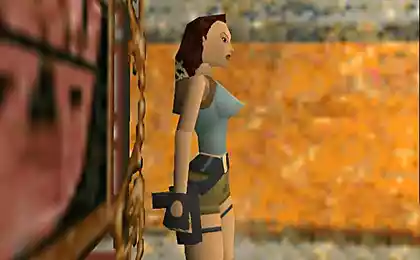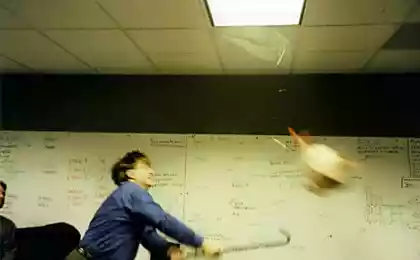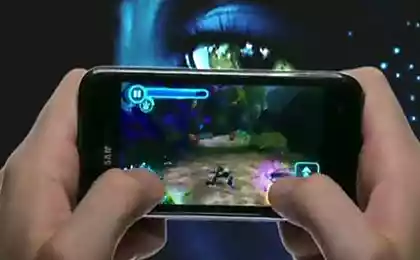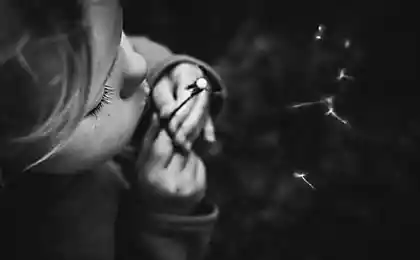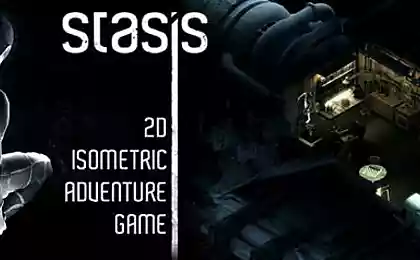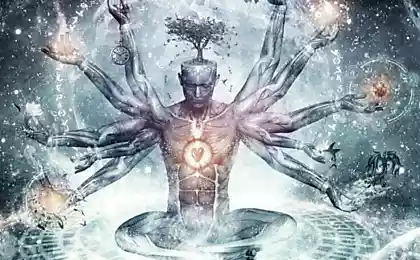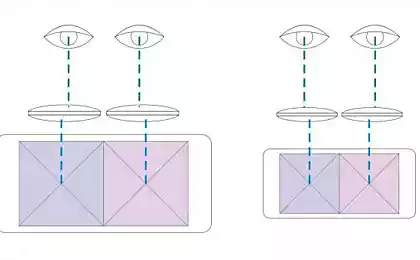1013
Mind Games (17 photos)
Around us are too many people who only committed to manipulate our consciousness, blowing dust in the eyes. This marketing and magicians, politicians and creative advertisers. We are, as a rule, take it for granted, so rather calmly react to another lip service. But there is someone who is very good at control our consciousness, we regularly deceiving and distracting. We trust him as anyone else, and do not expect a knife in the back. It "works" inside, and it - it is our brains.
Here are the tricks that he mastered to perfection:
1) We are blind to changes
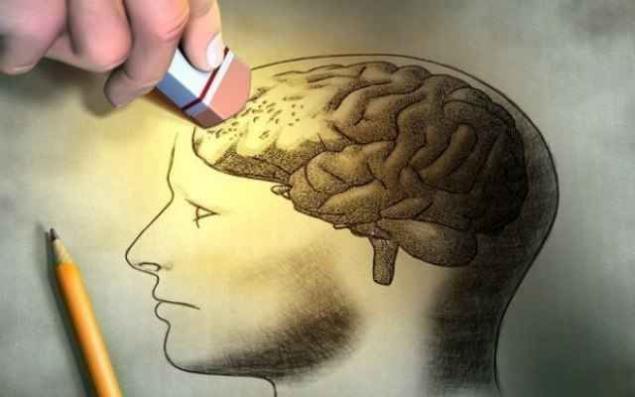
You know, you can not even notice the obvious changes in the object that was sent to your opinion a moment ago. What does this mean?
For example, you looked at a picture of their favorite artist, and then for a few seconds, you turn away from it, and then return to it.
If during your distractions on your pet will sunglasses and green jacket, you will in most cases will not notice the change, and all because of the fact that so constituted our main organ.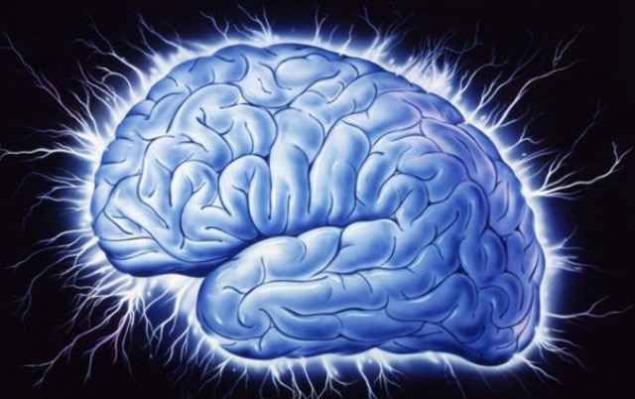
If you decide to check the said information, and again briefly turn away from the photos and returned to it, and specify vostorzhestvuete the green jacket, it still would be ahead of your brain, because it is now in the photo appeared purple wallpaper with rainbow.
The study of this phenomenon began in the 1970s by George McConkey (George McConkie). Psychologist post their illustrations on this topic on the same page, but the people who read his works still the first time could not find a difference between the first and second picture.
Why does he do it?

The phenomenon of our blindness to changes often associated with such concepts as "inattention blindness". If our brain is able to process all the details of the incoming image, the man just go mad and become insane.
Therefore, the brain is very selectively refers to information and focuses on potentially valuable data. Purple wallpapers rainbow is not. Brain gladly deceive you that the wallpaper had been there from the beginning, if only you do not dwell on this his attention.
Overdoing?

You will not even easy to imagine how the brain turns off the attention from details. This was proven in a single experiment. The reception office is located in one dummy employee who talked with the "experimental" by students, who came to get a job.
The employee explained how to fill out a questionnaire, which it referred and what will happen next. At the right moment another "employee" who all this time hiding under the counter, replaced his colleague. Applicants received from him a few questions, and the matter-of-factly replied to them without noticing the substitution.
This second man looked different, it had a different hairstyle and clothes!
2. Intermittent eye movement masked
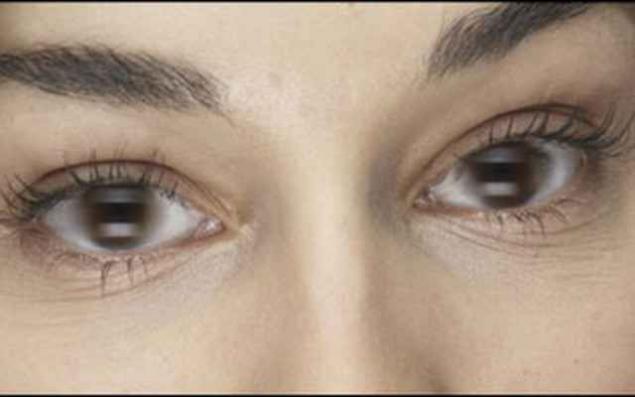
The bottom line is that about 40 minutes a day, each of us totally blind, but it does not notice.
You can check it out for yourself. Quickly direct his gaze toward the kitchen. In that split second when you looked away from the computer to the kitchen, you were completely blind. And, of course, did not notice.
Why does he do it?

You start feeling seasick just by watching "Pirates of the Caribbean"? Do you feel bad when the picture is rotated or shaking? The thing is that our brain does not like rapid change of image, and it is completely against any sudden movements.
But the movement of our eyes is much faster than the change of pictures. Turn your eyes again toward the kitchen. You do not feel dizzy. The thing is that our main body simply blocks the fuzzy image, which we had seen during eye movements.
However, when we redirect your gaze towards the other object, actually happens a few extra eye movements. This is an order of the brain. Thus all blurred images it just clears. And all to the surrounding reality did not seem to us to show sustained by Skype internet.
Overdoing?
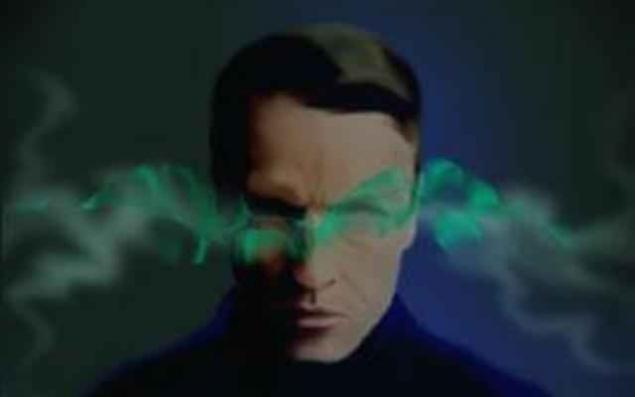
According to the most conservative estimates, is forty minutes of blindness in the day. At the same time the brain's all very beautiful masks, assuring us that no additional personnel during the transfer of the eyes from one object to another, does not exist.
3. Propriopertseptsiya
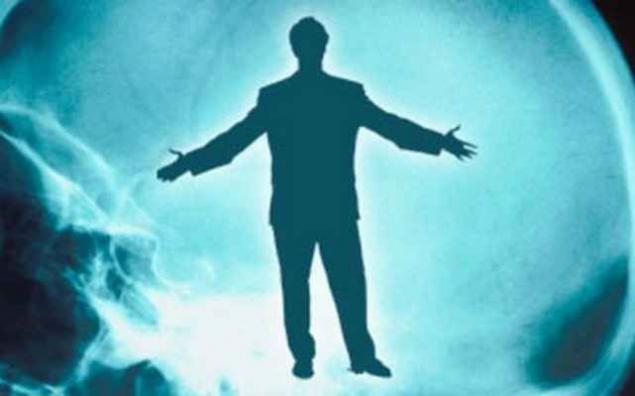
Imagine yourself that your brain has a card of your body. She's beautiful, 3D-format and in real time. However, in the brain sometimes inexplicably fits of geographical cretinism.
In other words, propriopertseptsiya - is the ability of the brain to always feel exactly where our limbs are located relative to the body. There is nothing strange, because it is thanks to this feature, we do not rush past the mouth delicious sandwich while reading an interesting book.
Why does he do it?
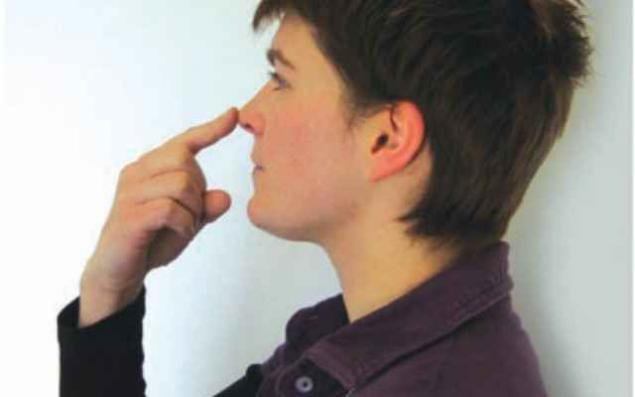
This time it's not on purpose. Except when it is the same cretinism, for example, under the influence of alcohol. Propriopertseptsiya does not work when intoxicated person can not first try to touch your index finger to the tip of the nose.
Overdoing?

In one experiment, a group of scientists led subjects to believe that their nose is growing at an unprecedented rate. For this, they misled the work propriopertseptsii system using electrical stimulation of the triceps and biceps. At the same time they have previously brought the index finger to the tip of the nose. Weird Science: real people have experienced the illusion that their nose up almost half a meter!
4. Unconscious plagiarism
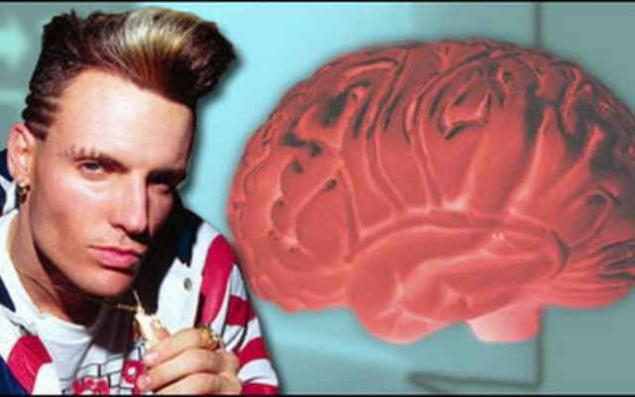
This trick is also known as cryptomnesia. Our brain is stealing other people's ideas, and we shoved them as their own. The brain is not around as good as it may seem. One of the weaknesses of its locations - it is an opportunity to remember that what is the source of an idea.
In the case of the brain, the main thing - it is the idea, and where it came from is not so important. Such situation sees our brain, which is absolutely not concerned with respect to copyright.
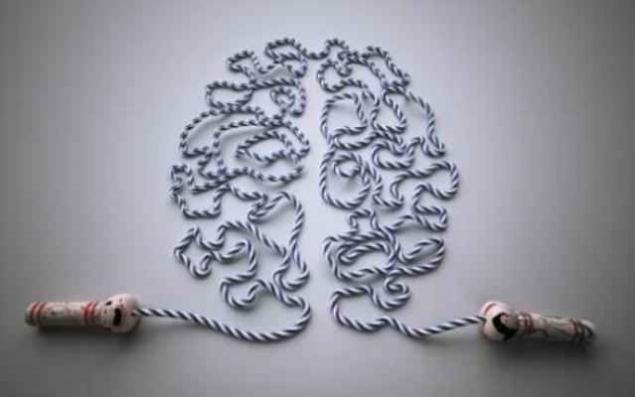
Examples rocked a little, but we know for sure that George Harrison (George Harrison), was forced to pay 600 thousand dollars for a "theft" of the song, which he sincerely believed his writing. It is likely that there are people who are convinced that it is they came up with the idea of writing a fairy tale about a boy wizard invited to the school to fight evil.
And who wants to make a movie about a little hairy little man, rescues all, throwing a magic ring into a volcano.
There are people who can not distinguish dreams from reality. It also cryptomnesia.
Why does he do it?

As already noted, the authorship of the story or some ideas do not matter for survival and when we endlessly trying to remember where in our mind certain poetic lines, the brain is irritated, and writes itself to the authors.
Overdoing?
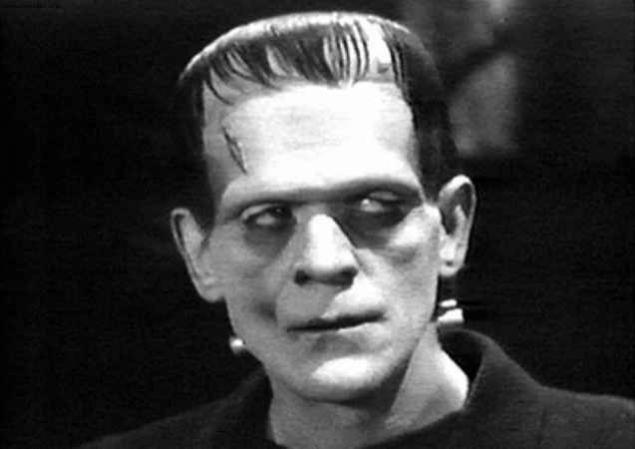
Studies confirm that cryptomnesia only works if the real author and "thief" of the same sex. Moreover, the more these two people like each other, the more likely the unconscious "theft».
Therefore, if a person suddenly announced, arguing that came up with the amazing story of Frankenstein, it almost certainly will be a woman.
5. Work subconscious
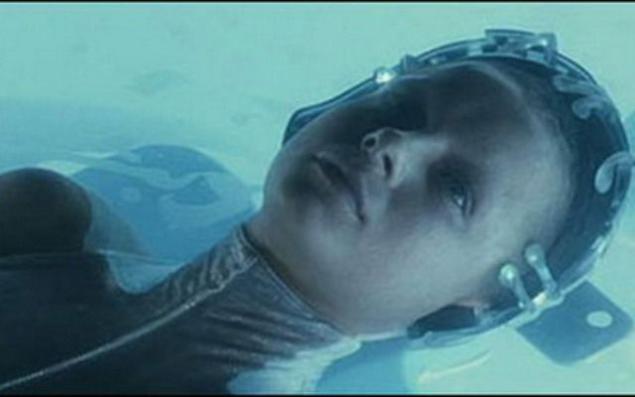
Some call it foresight. But in reality, this is another trick of the brain. This, of course, can be called predictions, but in fact the brain in this case is wrong very often.
However, our brains are always put forward suggestions on how he should act in a given situation. Moreover, she begins to act, "forgetting" to consult with the owner. In other words, we do a lot more to the realization that it must be done.
Why does he do it?
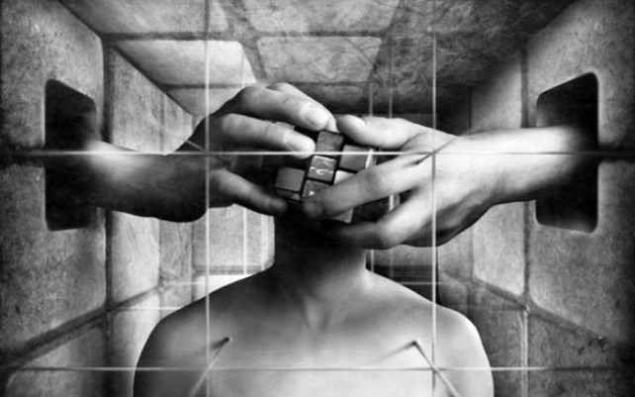
If not, this feature of the brain, we have the reputation as the most clumsy creatures in the world.
The human brain has a bright and intelligent and bold imagination, and many others, but most of our faculties useless in the event of unexpected danger. That is why our brains carefully keeps all the experience we have acquired, so that if something happens to give specific predictions.
Thus he lived experience has long been able to forget. You could burn a child with milk, and now the whole adult life blow on the water. What does this mean? Brain reinsured? Just over fools your head.
Overdoing?
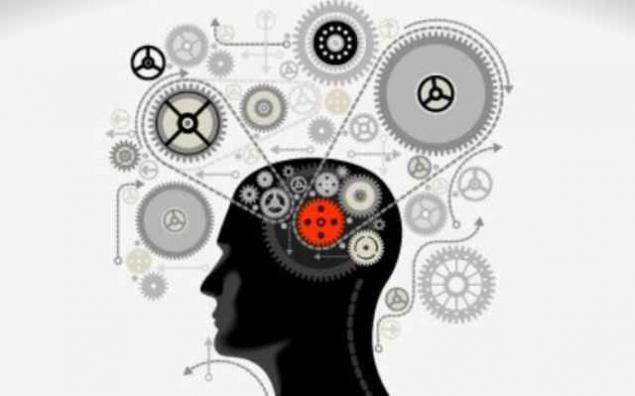
Experts recently discovered a curious thing: if the human brain is connected to a special scanner and specify the subject matter that requires a decision, the indicator associated with the responsibility for this operation region lights up for a few seconds before we consciously something to solve.
In other words, if in the morning you suddenly decide not to go to work, do not doubt that the idea of "sick" brain gave you just before awakening.
Here are the tricks that he mastered to perfection:
1) We are blind to changes

You know, you can not even notice the obvious changes in the object that was sent to your opinion a moment ago. What does this mean?
For example, you looked at a picture of their favorite artist, and then for a few seconds, you turn away from it, and then return to it.
If during your distractions on your pet will sunglasses and green jacket, you will in most cases will not notice the change, and all because of the fact that so constituted our main organ.

If you decide to check the said information, and again briefly turn away from the photos and returned to it, and specify vostorzhestvuete the green jacket, it still would be ahead of your brain, because it is now in the photo appeared purple wallpaper with rainbow.
The study of this phenomenon began in the 1970s by George McConkey (George McConkie). Psychologist post their illustrations on this topic on the same page, but the people who read his works still the first time could not find a difference between the first and second picture.
Why does he do it?

The phenomenon of our blindness to changes often associated with such concepts as "inattention blindness". If our brain is able to process all the details of the incoming image, the man just go mad and become insane.
Therefore, the brain is very selectively refers to information and focuses on potentially valuable data. Purple wallpapers rainbow is not. Brain gladly deceive you that the wallpaper had been there from the beginning, if only you do not dwell on this his attention.
Overdoing?

You will not even easy to imagine how the brain turns off the attention from details. This was proven in a single experiment. The reception office is located in one dummy employee who talked with the "experimental" by students, who came to get a job.
The employee explained how to fill out a questionnaire, which it referred and what will happen next. At the right moment another "employee" who all this time hiding under the counter, replaced his colleague. Applicants received from him a few questions, and the matter-of-factly replied to them without noticing the substitution.
This second man looked different, it had a different hairstyle and clothes!
2. Intermittent eye movement masked

The bottom line is that about 40 minutes a day, each of us totally blind, but it does not notice.
You can check it out for yourself. Quickly direct his gaze toward the kitchen. In that split second when you looked away from the computer to the kitchen, you were completely blind. And, of course, did not notice.
Why does he do it?

You start feeling seasick just by watching "Pirates of the Caribbean"? Do you feel bad when the picture is rotated or shaking? The thing is that our brain does not like rapid change of image, and it is completely against any sudden movements.
But the movement of our eyes is much faster than the change of pictures. Turn your eyes again toward the kitchen. You do not feel dizzy. The thing is that our main body simply blocks the fuzzy image, which we had seen during eye movements.
However, when we redirect your gaze towards the other object, actually happens a few extra eye movements. This is an order of the brain. Thus all blurred images it just clears. And all to the surrounding reality did not seem to us to show sustained by Skype internet.
Overdoing?

According to the most conservative estimates, is forty minutes of blindness in the day. At the same time the brain's all very beautiful masks, assuring us that no additional personnel during the transfer of the eyes from one object to another, does not exist.
3. Propriopertseptsiya

Imagine yourself that your brain has a card of your body. She's beautiful, 3D-format and in real time. However, in the brain sometimes inexplicably fits of geographical cretinism.
In other words, propriopertseptsiya - is the ability of the brain to always feel exactly where our limbs are located relative to the body. There is nothing strange, because it is thanks to this feature, we do not rush past the mouth delicious sandwich while reading an interesting book.
Why does he do it?

This time it's not on purpose. Except when it is the same cretinism, for example, under the influence of alcohol. Propriopertseptsiya does not work when intoxicated person can not first try to touch your index finger to the tip of the nose.
Overdoing?

In one experiment, a group of scientists led subjects to believe that their nose is growing at an unprecedented rate. For this, they misled the work propriopertseptsii system using electrical stimulation of the triceps and biceps. At the same time they have previously brought the index finger to the tip of the nose. Weird Science: real people have experienced the illusion that their nose up almost half a meter!
4. Unconscious plagiarism

This trick is also known as cryptomnesia. Our brain is stealing other people's ideas, and we shoved them as their own. The brain is not around as good as it may seem. One of the weaknesses of its locations - it is an opportunity to remember that what is the source of an idea.
In the case of the brain, the main thing - it is the idea, and where it came from is not so important. Such situation sees our brain, which is absolutely not concerned with respect to copyright.

Examples rocked a little, but we know for sure that George Harrison (George Harrison), was forced to pay 600 thousand dollars for a "theft" of the song, which he sincerely believed his writing. It is likely that there are people who are convinced that it is they came up with the idea of writing a fairy tale about a boy wizard invited to the school to fight evil.
And who wants to make a movie about a little hairy little man, rescues all, throwing a magic ring into a volcano.
There are people who can not distinguish dreams from reality. It also cryptomnesia.
Why does he do it?

As already noted, the authorship of the story or some ideas do not matter for survival and when we endlessly trying to remember where in our mind certain poetic lines, the brain is irritated, and writes itself to the authors.
Overdoing?

Studies confirm that cryptomnesia only works if the real author and "thief" of the same sex. Moreover, the more these two people like each other, the more likely the unconscious "theft».
Therefore, if a person suddenly announced, arguing that came up with the amazing story of Frankenstein, it almost certainly will be a woman.
5. Work subconscious

Some call it foresight. But in reality, this is another trick of the brain. This, of course, can be called predictions, but in fact the brain in this case is wrong very often.
However, our brains are always put forward suggestions on how he should act in a given situation. Moreover, she begins to act, "forgetting" to consult with the owner. In other words, we do a lot more to the realization that it must be done.
Why does he do it?

If not, this feature of the brain, we have the reputation as the most clumsy creatures in the world.
The human brain has a bright and intelligent and bold imagination, and many others, but most of our faculties useless in the event of unexpected danger. That is why our brains carefully keeps all the experience we have acquired, so that if something happens to give specific predictions.
Thus he lived experience has long been able to forget. You could burn a child with milk, and now the whole adult life blow on the water. What does this mean? Brain reinsured? Just over fools your head.
Overdoing?

Experts recently discovered a curious thing: if the human brain is connected to a special scanner and specify the subject matter that requires a decision, the indicator associated with the responsibility for this operation region lights up for a few seconds before we consciously something to solve.
In other words, if in the morning you suddenly decide not to go to work, do not doubt that the idea of "sick" brain gave you just before awakening.



